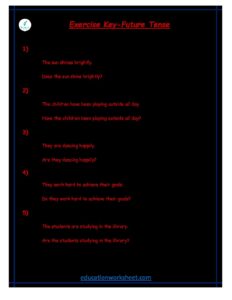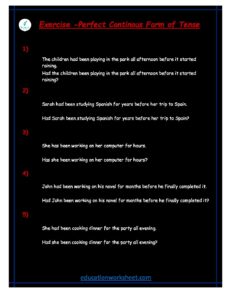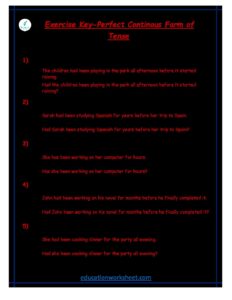changing Perfect Tense to positive and interrogative
changing Perfect Tense to positive and interrogative
Tenses are the backbone of any language, allowing us to express actions and events in relation to time. One of the fundamental tenses in English is the Perfect Tense. Perfect Tense is used to describe actions that have been completed or have some relevance to the present or past. This tense plays a crucial role in our daily communication. In this comprehensive guide, we will delve into the conversion of Perfect Tense sentences from affirmative to interrogative forms.
Perfect Tense Overview:
Before we dive into the intricacies of changing Perfect Tense sentences from affirmative to interrogative, it is essential to understand the basics of Perfect Tense.
Perfect Tense, in English, is formed by using the auxiliary verb ‘have’ or ‘has’ (for present perfect) or ‘had’ (for past perfect) followed by the past participle of the main verb. It is commonly used to indicate actions that are completed, continuous actions that started in the past and continue into the present, and actions that have a present relevance.
Affirmative Perfect Tense:
In an affirmative Perfect Tense sentence, we affirm or state a fact. For example:
- She has finished her homework.
- They had visited the museum before it closed.
These sentences state actions in the affirmative. However, when we want to ask questions using the same tense, we use the interrogative form.
Changing Perfect Tense from Affirmative to Interrogative:
Present Perfect Tense:

To change an affirmative sentence in the Present Perfect Tense to an interrogative one, we simply swap the positions of the auxiliary verb ‘have’ or ‘has’ and the subject.
Affirmative: She has finished her homework. Interrogative: Has she finished her homework?
Affirmative: They have eaten dinner. Interrogative: Have they eaten dinner?
Past Perfect Tense:

In the case of the Past Perfect Tense, we follow a similar structure. The auxiliary verb ‘had’ is moved in front of the subject to form the interrogative sentence.
Affirmative: He had completed the task. Interrogative: Had he completed the task?
Affirmative: They had left before we arrived. Interrogative: Had they left before we arrived?
It is important to note that when forming interrogative sentences, we use question words such as ‘what,’ ‘where,’ ‘when,’ ‘why,’ ‘who,’ ‘which,’ and ‘how’ at the beginning of the sentence to ask specific questions.
Example:
- Affirmative: She has traveled to many countries.
- Interrogative: Where has she traveled?
- Affirmative: They had finished the project before the deadline.
- Interrogative: How had they finished the project before the deadline?
Adding Question Words:
Adding question words at the beginning of interrogative sentences provides context and specificity to the question. Different question words are used for different types of information we want to elicit:
Wh-Question Words:
- What: Used to inquire about things or actions.
- Where: Used to ask about locations.
- When: Used to inquire about time or dates.
- Why: Used to understand reasons or motivations.
- Who: Used to ask about people.
- Which: Used to choose between options.
- How: Used to ask about the manner or method.
Let’s look at some examples:
-
- What have you done?
- Where did they go for vacation?
- When had she completed the assignment?
- Why had he resigned from his job?
- Who has my pen?
- Which movie have you watched?
- How did she manage to solve the problem?Yes/No Questions:
In addition to the wh-questions, Perfect Tense interrogative sentences can also be simple yes/no questions. To do this, we use the same structure as before, but without a question word. The main focus here is to obtain a yes or no response.
- Has she finished her book?
- Had they met before?
- Have you seen that movie?
- Had he called you?Tag Questions:
Tag questions are used to confirm or seek agreement in an informal manner. These questions are usually formed by adding a short tag at the end of a sentence, which mirrors the verb tense of the sentence.
- You’ve finished your work, haven’t you?
- She had dinner, hadn’t she?
- They’ve arrived, haven’t they?
- He called, didn’t he?
Negative Interrogatives:
In Perfect Tense interrogative sentences, you can also add a negative element to the question. This is typically done by adding the word ‘not’ after the auxiliary verb. In this case, ‘not’ is contracted with ‘have’ or ‘has’ to form ‘haven’t’ or ‘hasn’t’ in the present perfect, and ‘had’ in the past perfect.
- Has she not finished her book?
- Had they not met before?
- Haven’t you seen that movie?
- Hadn’t he called you?
changing Perfect Tense to positive and interrogative

Common Mistakes to Avoid:
While changing Perfect Tense sentences from affirmative to interrogative, there are some common mistakes that should be avoided:
- Verb Agreement: Make sure the auxiliary verb (have, has, or had) agrees with the subject in number and person. For example, “He has” and “They have.”
- Proper Placement: Ensure that the auxiliary verb is placed before the subject, whether it is in the form of a question word or not.
- Correct Punctuation: Use the appropriate question mark at the end of the interrogative sentence to indicate that it is a question.
- Clear and Concise: Be specific in your choice of question words to make your question clear and focused.

